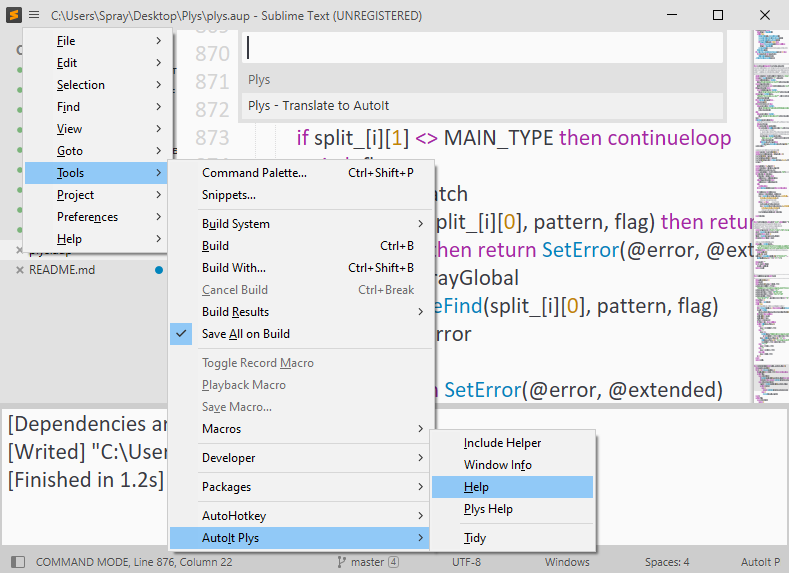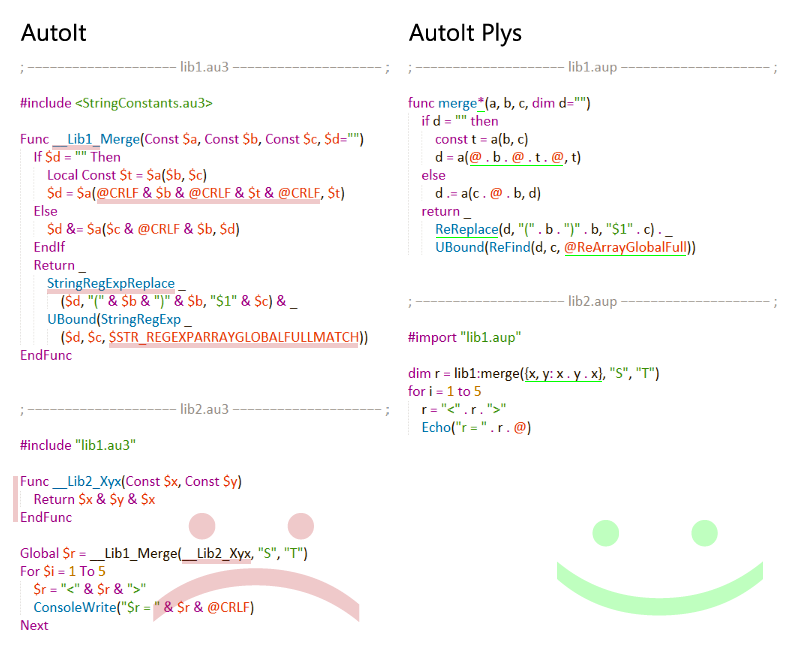Search the Community
Showing results for tags 'anonomousfunctions'.
-
Plys (/ˈplaɪz/) represents the inconspicuous wrapper which complements the AutoIt language with preprocessor keyword #import "filename" loads only public functions and variables Python-like code blocks by lines indentation (without endfunc, wend etc.) dim and const outside of functions means global and global const respectively, inside of functions means local and local const arguments of function are const by default, but with dim prefix it becomes variable short synonyms for functions as a rule using in large projects: for arrays, files and strings no “$” prefix in variable names single-line anonymous functions and each of this is optional Overview ; file “mylib.aup” dim foo*, bar func baz*() foo = quux() func quux(dim arg="one/two/three") bar = Sort(Split(arg, "/", @NoCount)) return "begin" . @ . bar[0] . @ . "end" ; file “main.aup” #import "mylib.aup" … In this example variable bar and function quux() are private for module mylib.aup (names at declaration ends with an asterisk) and not visible in main.aup. Variable foo and function baz() will be visible with the “mylib:” prefix: ; file “main.aup” #import "mylib.aup" foo = baz() ; error: no foo and baz() in this scope mylib:foo = mylib:baz() ; OK: foo and baz() are public in “mylib” scope mylib:bar = mylib:quux() ; error: bar and quux() are private in “mylib” scope Sort is synonym for _ArraySort, Split is synonym for StringSplit, @NoCount is synonym for $STR_NOCOUNT, “@” is synonym for @CRLF, “.” is synonym for “&” operator. All synonyms Setup Requirements: AutoIt (minimum), AutoIt Script Editor (optionally). Download and unpack archive from latest release. Double click the “setup.aup.au3” file and follow to setup instructions. First steps Right-click in the any folder and select New > AutoIt Plys Script. Right-click on the created file again and select Edit Script. At the bottom of the file type the following: #include <MsgBoxConstants.au3> dim msg = "" for i = 1 to 10 msg .= "Hello World!" . @ msg = TrimRight(msg, 1) MsgBox(MB_OK, "My First Plys Script", msg) Save the script and double-click the file for run (or right-click the file and select Run Script). Extra options You can use extra options by typing in the script one of this: #plys dollarprefix ; refuse to use variables without “$” prefix #plys noconst ; use default variable declarations behavior #plys noindent ; ignore indentation but obligue to use “endif/wend/etc”. #plys noimport ; refuse the import operator #plys nosynonyms ; refuse the function and macro synonyms #plys nolambda ; refuse the anonymous functions Environment After installation Plys already integrated to Windows shell. If you want to run a script by command line use <AutoIt3.exe path> <AutoIt3exe folder>\Plys\plys.aup.au3 [/Rapid] [/ErrorStdOut] [/NoStdio] <script path> [<arguments>] /Rapid means that if source files have not be modified since the previous run, they will not be re-translated. This option speeds up script execution startup. The /ErrorStdOut switch allows the redirection of a fatal error to StdOut which can then be captured by an application. Also you can turn off data exchange through standard input/output streams, then the shell process will not hang in memory, but then you will not be able to observe the output of your program in the output window of your development environment. You can do this by adding the /NoStdio option. If you want to translate a script to pure AutoIt code use <AutoIt3.exe path> <AutoIt3exe folder>\Plys\plys.aup.au3 [/Translate] <script path> Try AutoIt Plys package for Sublime Text which including syntax highlighting, auto-completions, build systems for run and compile, context help, “goto” feature, comments toggling, Tidy and Include Helper command for AutoIt and AutoIt Plys. You can compile the script, specifying to the compiler the translated file *.aup.au3. How it works The plys.aup.au3 file contains the code that will run immediately after the launch of your script. On setup this file will copy to AutoIt install dir (as Plys\plys.aup.au3) and aup-files will associated with it. On the launch aup-files are automatically processed, after which the new AutoIt process interprets the already converted code, and the current process remains cycle to continue data exchange with the new process via standard streams. This handler replaces all #import with #include. The processed files get the extension .aup.au3 and are placed in the folder of the original script with “hidden” attribute. Future #import "filename.aup" noprefix #import "mylib.aup" noprefix bar = foo() ; bar and foo will be taken from the “mylib.aup” without “mylib:” prefix #import "filename.aup" as alias #import "mylib.aup" as ml ml:bar = ml:foo() ; bar and foo will be taken from the “mylib.aup” function scope functions func GlobalFunc() dim var1 = "body" func LocalFunc(var2) return "begin" . @ . var2 . @ . "end" return LocalFunc(LocalFunc(var1)) MsgBox(MB_OK, "begin/body/end", GlobalFunc()) array values in place and array comprehension a = [3, 7, 1] for i in [1, 2, 4] Echo(i . @) Display([t*3 for t in a if t > i]) ; if i = 2 then Display([9, 21]) etc. Download Repository on GitHub Very old version (import only): import
- 6 replies
-
- lambda
- modularity
-
(and 2 more)
Tagged with:
-
- _____ _____ _ _ - |_ _|___ ___ ___ _ _| __|___ ___|_|___| |_ - | | | -_| -_| | | |__ | _| _| | . | _| - |_| |___|___|_|_|_ |_____|___|_| |_| _|_| - By TarreTarreTarre|___|Build '1.0.0' |_| + F5 = Run script + F6 = Build 'AU3' + F7 = Build 'EXE' + F8 = Options GUI + F10 = Exit TeenyScript All example code and documentation moved to: http://teenyscript.tarre.nu/documentation Official Github repo: http://github.com/tarreislam/teenyscript F.A.Q Q: What is TeenyScript? A: TeenyScript is a Superset of AutoIt which makes it more advanced Q: How does it work? A: TeenyScript code are parsed into native AutoiT code Q: Does it depend on anything else than AutoIt? A: Just one dependency, that is AutoitObject, the best UDF ever created for AutoIt, besides that, only Native AutoIt is used Features "Anonymous" functions Endless scope nesting OOP (powered by AutoitObject) User-friendly integration Powerful macros Namespaces Lists Project support, for easy deployment Userfriendly GUI for userfriendly Tasks for the Userfriendly person And much more To come You decide, I am happy to do requests! Install and Update TeenyScript HOW TO GET STARTED Run TeenyScript.au3 Now this should see something like this in your console Code Press F8 and navigate to the misc tab to install SciTE calltips Run \ Build \ Compile How to run with Sublime Text Here is some examples of TeenyScript code ;Basic List usage $Example_A = Func() ; Create a list Local $myList = { 'Name': 'Tarre' } ; Add \ Change data on $MyList $myList{'Age'} = 25 ; Create MySecondList Local $MySecondList = { "Name" => "John", "Age" => "00" } ; Using variable instead of a string Local $KeyName = "Age" Local $KeyVal = 1337 $MySecondList{$KeyName} = $KeyVal ; You may also pass lists to lists. however this has to be done in this fashion. Local $oList = {'myList': $myList, 'mySecondList' => $MySecondList} ; Return the objects Return $oList EndFunc();call the function on the variable ; Loop through list and print their values $Example_B = Func() Local $MyList = {'A': 'Hello FROM A', 'B': 'Hello FROM B', 'C': 'Hello FROM C'} Local $aNames = ['A', 'B', 'C'] For $i = 0 To UBound($aNames) -1 MsgBox(0,0,$myList{$aNames[$i]}) Next EndFunc #MAIN MsgBox(0,"Example A 1", $Example_A.myList.Name) MsgBox(0,"Example A 2", $Example_A.myList.Age) MsgBox(0,"Example A 3", $Example_A.mySecondList.Name) MsgBox(0,"Example A 4", $Example_A.mySecondList.Age) $Example_B(); Execute examble B Here is a non class nested function calculator example (calculator.ts.au3) $calculator = Func($a, $and, $b) $division = Func($a, $b) if Not $a or Not $b Then Return "Error dividing 0" EndIf Return $a/$b EndFunc Switch $and Case '+' Return $a + $b Case '-' Return $a - $b Case '/' Return $division($a, $b) Case '*' Return $a * $b EndSwitch Return "Unkown attribute "&$and EndFunc #MAIN ConsoleWrite($calculator(25, '*', 25)&@CRLF) ConsoleWrite($calculator(25, '/', 0) & @CRLF) ConsoleWrite($calculator(1, '^', 2) & @CRLF) teeny-script.zip (OLD) TeenyScript beta2.zip (OLD) teeny-script Beta 4.zip (OLD) teeny-script Beta 5.zip (OLD) teeny-script BETA 6.zip (OLD) TeenyScript Beta 7.zip (OLD) teeny-script Beta 8.zip (OLD) TeenyScript-master 1.0.0.zip (OLD) TeenyScript-1.1.0.zip (OLD) TeenyScript-1.2.0.zip (OLD) TeenyScript-2.0.0.zip (OLRD, Release notes) TeenyScript-2.1.3.zip (Newest 2016-09-16, Release notes)
- 29 replies
-
- anonomousfunctions
- teenyscript
-
(and 1 more)
Tagged with:





